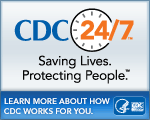Global Violence Prevention: Additional Activities
CDC Training and Technical Assistance in Violence Prevention
CDC provides training and technical assistance in violence prevention to organizations, governments, and other partners around the world. The following are examples:
- CDC provided funding and technical assistance to the World Health Organization on Preventing Suicide: a global imperative - the first world report on suicide. The report presents the latest information and data on suicide and suicide prevention efforts worldwide, identifies evidence-based approaches to suicide prevention that can be adapted to different settings, and encourages strategic, collaborative actions to have the greatest impact.
- The Global Status Report on Violence Prevention 2014 takes stock of how governments are making a difference by preventing and responding to interpersonal violence. The report – which will serve as a benchmark to track future progress – assesses the extent to which countries have been implementing the recommendations of the World Report on Violence and Health, as called for in WHA Resolution 56.24. CDC provided funding and technical assistance to this effort and also worked with Federal partners to share the United States’ progress in gathering the latest data on interpersonal violence in all its forms, implementing the best available evidence, providing services to victims, and protecting people through laws and other policies.
- CDC, in collaboration with partners, participated in the development of the International Classification for External Causes of Injuries (ICECI) and jointly published other guidance tools to advance the collection and analysis of injury data, including the WHO/CDC Injury Surveillance Guidelines and Guidelines for Conducting Community Surveys on Injuries and Violence. These tools provide a way to collect robust, reproducible, and relatively easy-to-obtain injury data to inform community-based injury prevention efforts.
- CDC has assisted several countries in Africa, Eastern Europe, and Latin America in developing hospital-based injury surveillance systems to gather information on non-fatal injuries. These systems help officials figure out how to best prevent injuries. The Injury Surveillance Training Manual and Data Collection Form were designed primarily for professionals who develop or operate surveillance systems and conduct prevention activities in less-resourced countries. The manual describes steps needed to establish and maintain an injury surveillance system; provides information on designing and monitoring prevention activities; and offers guidance for making informed decisions about injury prevention.
- CDC has helped the World Health Organization develop tools for researchers and practitioners to gather important information about violence and expand our knowledge about what works to prevent violence, including Preventing Child Maltreatment: A Guide to Taking Action and Generating Evidence [PDF 253KB] and Preventing Intimate Partner and Sexual Violence against Women: Taking Action and Generating Evidence [PDF 1MB]. CDC is currently working with the World Health Organization on a tool to prevent youth violence in lower and middle-income countries.
- The World Health Organization, with technical assistance and funding from CDC, established MENTOR-VIP, a global mentoring program to build skills in injury and violence prevention research and programming, and TEACH-VIP, a global Web-based training course on injury and violence prevention.
- CDC supports the Institute of Medicine in the development of a Global Violence Prevention Forum. The Forum helps a group of governments and private sector organizations exchange information and ideas about violence prevention, especially in low- and middle-income countries. The Forum also helps clarify policy, research, and practice priorities for further study or investment and uses workshops and reports to educate leaders and the public about the scientific basis of public health needs for global violence prevention.
- Page last reviewed: February 18, 2015
- Page last updated: April 25, 2016
- Content source:


 ShareCompartir
ShareCompartir
